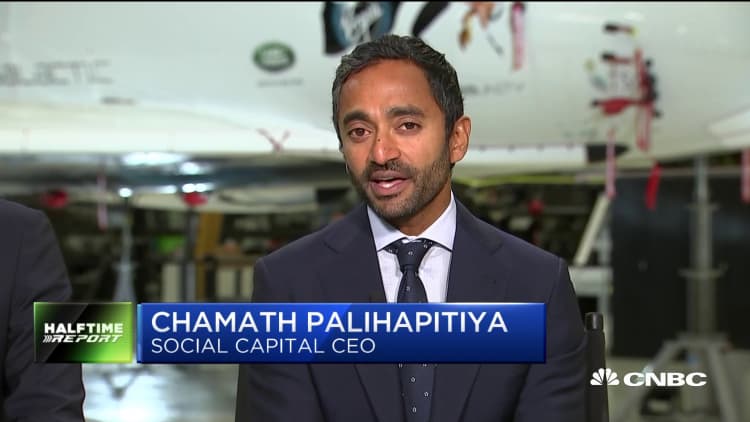
Tech investor Chamath Palihapitiya slammed WeWork's corporate governance on CNBC on Tuesday.
"It is really a tale of pretty failed governance, almost of the highest order, short of something fraudulent, and that's really quite a shame," Palihapitiya said on "Fast Money Halftime Report."
"If we're going to have credibility with the public markets," he continued, start-ups — and the venture capital money behind them — need to pay special attention to the way the operating rules of their companies are set up.
Palihapitiya's comments come as office-sharing company WeWork delayed its planned initial public offering after a number of setbacks, including criticism about the CEO having too much power and a massive valuation cut.
On Friday, seemingly in a bid to assuage concerns over founder and CEO Adam Neumann's power, the board changed its voting structure to diminish his influence, according to an amended IPO filing. WeWork also eliminated a provision allowing Neumann's wife, Rebekah, to lead the search for his successor should he ever become permanently disabled or deceased. Instead, the board would pick a successor.
WeWork declined to comment on Palihapitiya's remarks, citing its IPO quiet period. The company did say it expects the deal to be completed by the end of the year.
Palihapitiya, an early Facebook executive turned venture capitalist, said he believes that WeWork has found a "product market fit," given the fact that WeWork's customers enjoy the flexibility of co-working space.
He said he is unsure whether WeWork's business model would work in the long run but that's a problem it could "probably" overcome.
WeWork, in its IPO disclosure, reported net losses of more than $900 million for the first six months of 2019 on revenues of $1.54 billion.
Still, the issue of corporate governance is entirely different, Palihapitiya said, adding that's why he believes it's a bad investment.
"I would want to see levels of control where there is fiduciary responsibility on behalf of the executive team and the board and the investor base," he said. "In the absence of that as a public market investor, I feel like I'm making a bet that has too much risk for not enough return. So from my perspective, I'm sort of watching from the sidelines."
Palihapitiya, one of Silicon Valley's most outspoken investors, launched in 2017 a special-purpose acquisition company, known as a SPAC. A year later, he shut down the venture capital arm of his firm Social Capital to outside investors.
Earlier this year, the SPAC, Social Capital Hedosophia, merged with billionaire entrepreneur Richard Branson's space tourism unit Virgin Galactic, with plans to go public later this year.
Correction: This story has been updated to correct the spelling of WeWork CEO Adam Neumann's name.


